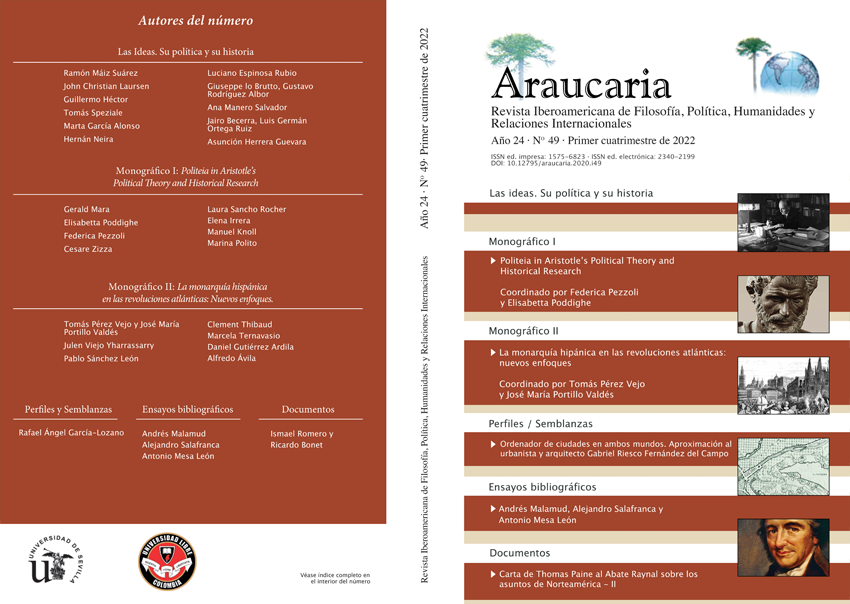Thomas Mann's Retreat from Irony in Politics
DOI:
https://doi.org/10.12795.02Palabras clave:
Thomas Mann, ironia, politicaResumen
Thomas Mann desarolló una de las teorías más sútiles de la ironía durante la Primera Guerra Mundial, declarando que la mejor ironía era la ironía contra los dos lados de cualquier asunto. Su ironía no fue inconsistente con amor por la humanidad, y aun por los dos lados. Podría justificarse a Mann por usar ironía contra los dos lados en ese guerra. Pero cuando subieron los Nazis, Mann abandonó la ironía contra los dos lados e ironizó contra solo un lado, los Nazis. Por un lado, esa fue una posición politico mejor, pero por otro lado perdió casi todo el uso del tropo de la ironía en sus escritos politicos antes y durante la guerra. Podría haber sido justificado en tiempos de tanto peligro, pero significaba menos arte y sutilidad en sus escritos políticos de la época.
Descargas
Citas
Adorno, T. W. and T. Mann, Briefwechsel 1943-1955, eds. C. Gödde and T. Sprecher (Frankfurt: Suhrkamp, 2002).
Booth, W., A Rhetoric of Irony (University of Chicago Press, 1974).
Ferguson, N., The Pity of War (New York: Basic Books, 1999).
Horkheimer, M. and T. W. Adorno, Dialectic of Enlightenment (Stanford: Stanford University Press, 2002).
Laursen, J. C., “Thomas Mann y la espada de doble filo de la ironía en la política” in Nicolás Sánchez Durá, ed., Cultura contra civilización: En torno a Wittgenstein (Valencia: Pre-Textos, 2008), 57-66.
Mann, K., Unwritten Memories (London: Deutsch, 1975.
Mann, T., Past Masters and Other Papers (London: Martin Secker, 1933).
Mann, T., Order of the Day: Political Essays and Speeches of Two Decades (New York: Knopf, 1942).
Mann, T., Essays of Three Decades (New York: Knopf, 1947).
Mann, T., The Story of a Novel: The Genesis of Doctor Faustus, tr. R. and C. Winston (New York: Knopf, 1961).
Mann, T., Reflections of a Nonpolitical Man (New York: Ungar, 1983).
Mann, T., The Magic Mountain (New York: Vintage, 1995).
Mann, T., Essays, eds. Hermann Kurzke and Stephan Stachorski (Frankfurt: Fischer, 1996).
Mann, T., Thomas Mann: On Myself and other Princeton Lectures, ed. James Bade (Frankfurt: Lang, 1996).
Mann, T., Doctor Faustus (New York: Knopf, 1997).
Mann, T., Thomas Mann’s Addresses Delivered at the Library of Congress, ed. Don Heinrich Tolzmann (Bern: Lang, 2003).
Reed, T. J., “Mann and history” in Ritchie Robinson, ed., The Cambridge Companion to Thomas Mann (Cambridge University Press, 2002).
Schmidt, J., “Mephistopheles in Hollywood: Adorno, Mann, and Schoenberg” in The Cambridge Companion to Adorno, ed. T. Huhn (Cambridge University Press, 2004), 148-180.
Stock, I., Ironic Out of Love: The Novels of Thomas Mann (Jefferson: McFarland, 1994.
Vaget, H. R., “The Steadfast Tin Soldier: Thomas Mann in World Wars I and II” in Reinhold Grimm and Jost Hermand, eds., 1914/1939: German Reflections of the Two World Wars (Madison: University of Wisconsin Press, 1992).
Descargas
Publicado
Cómo citar
Número
Sección
Licencia
Las ediciones impresa y electrónica de esta Revista son editadas por el Secretariado de Publicaciones de la Universidad de Sevilla, siendo necesario citar la procedencia en cualquier reproducción parcial o total.Salvo indicación contraria, todos los contenidos de la edición electrónica se distribuyen bajo una licencia de uso y distribución “Creative Commons Atribución-NoComercial-SinDerivar 4.0 Internacional”








